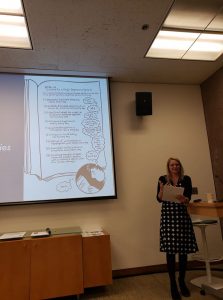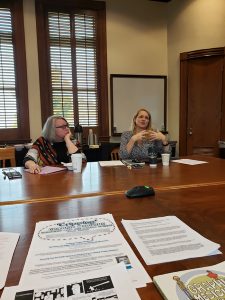
November 15, 2019
During the fall 2019 semester, the Burton Blatt Institute’s (BBI) Office of Interdisciplinary Programs and Outreach (OIPO) hosted a two-part symposium, ‘Cripping’ Graphic Medicine. Elizabeth J. Donaldson, professor of English and Interim associate dean for curriculum and student success at the New York Institute of Technology (NYIT), gave a public lecture on October 29th entitled, “Psychiatric Disability, ‘Crip’ Culture and the Humanities,” followed by a workshop on October 30th entitled, “Drawing Out the Public Sphere: A Workshop on ‘Cripping’ Graphic Medicine.” A Syracuse University News feature describing the events was published on October 22nd.
Both fall events, and two more events scheduled for the spring of 2020 (with MK Czerwiec, R.N., M.A.), were funded by the Humanities Center’s Syracuse Symposium series, the theme of which this year is “Silence.” All four events are co-sponsored by the Consortium for Culture and Medicine—a collaboration between Le Moyne College, Syracuse University, and SUNY Upstate Medical University—and the Syracuse University College of Arts and Sciences. Research Professor Diane R. Wiener, OIPO’s Associate Director, authored the awarded symposium proposal with Prof. Rebecca E. Garden of Upstate Medical University. Prof. Garden, who is Executive Director of the Consortium for Culture and Medicine, planned all four events with Prof. Wiener, with ongoing support from OIPO’s Administrative Assistant, Rachael Zubal-Ruggieri.
OIPO’s 2019-2020 symposium focuses on the emerging cross-disciplinary field of Graphic Medicine. In order to engage Syracuse University’s and Upstate Medical University’s constituents collaboratively, Graphic Medicine draws linkages across disability studies and the health humanities. The two public lectures and two focused workshops were designed to advance healthcare theory and practice as well as disability justice. The symposium proposal noted, “Graphic Medicine’s innovative, interdisciplinary approach, borne out of the humanities, is increasingly represented in both humanities and medical journals (such as JAMA) and curricula as a way to deepen conversations among healthcare professionals and learners as well as those who seek healthcare, caregivers, activists, and advocates.”
The conceptualization of ‘cripping’ is central to the work of the 2019-2020 symposium. The proposal also noted, “Like much of the work of disability studies, Graphic Medicine investigates biocultural and biopolitical issues such as quality of life and quality of healthcare, within and beyond academic environs, practice contexts, and public intellectual arenas. However, the methods adopted by many of even the most thoughtful memoirists, novelists, and webcomic creators of Graphic Medicine do not yet take into account disability, whether as a subject of investigation or through the adaptations necessary to (re)fashion this primarily visual medium so that it is consistently accessible to a spectrum of creators and audiences. We argue, then, for ‘Cripping’ Graphic Medicine.”
While Prof. Donaldson visited Syracuse, she was also interviewed by Upstate Medical University’s “HealthLink On Air” podcast team. The title of the interview was “Health Care and Comics are Linked in the Field of Graphic Medicine.”
American Sign Language (ASL) interpretation, Communication Access Real-time Translation (CART), image descriptions of visual elements, videography, and inclusive food were all facets of these events. Both the fall and spring ‘Cripping’ Graphic Medicine public lectures will be posted on the OIPO website, with captions and image descriptions.

Prof. Donaldson’s presentation was attended by a wide array of faculty members, undergraduate and graduate students, administrators, and local and regional community practitioners from many backgrounds and fields of interest, including disability studies, art history, peer advocacy, digital humanities, journalism, healthcare, and social work. The interactions during both the public presentation and workshop were robust, engaging, and instructive, focusing on myriad themes, including the politics of representation, implications for healthcare practice, countering ableism, meeting disability and mental health access needs, and the complexities of recovery, resilience, family representation, and living with mental illness–particularly schizophrenia.